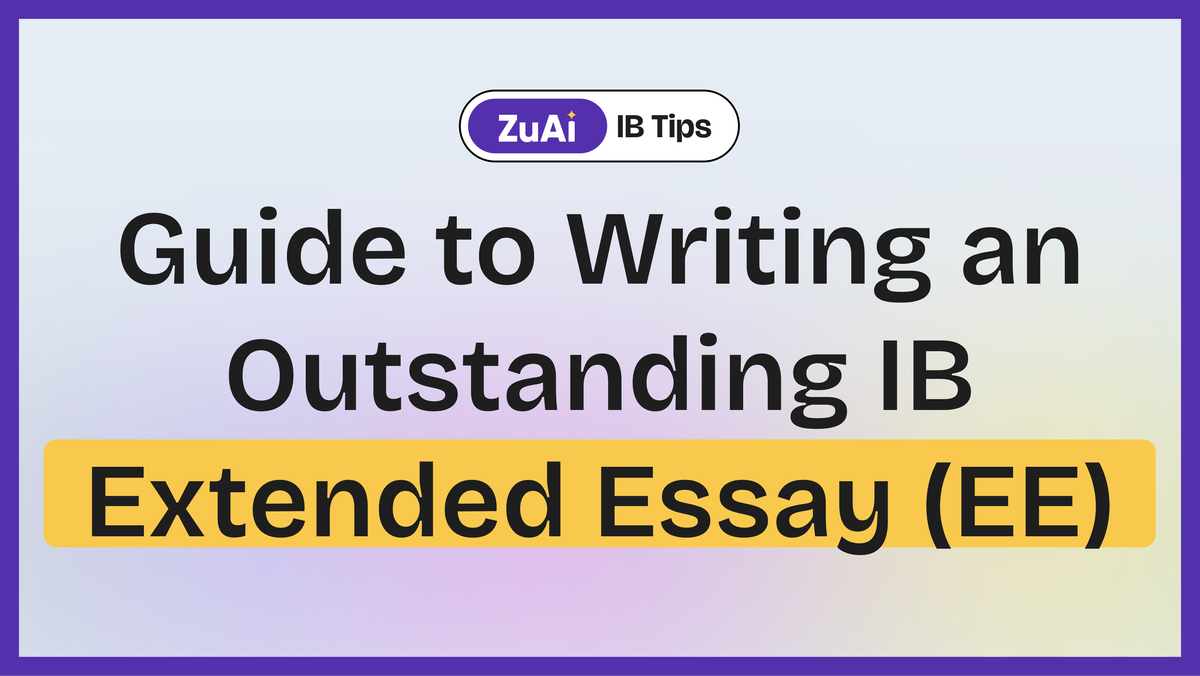Complete Guide to Writing an Outstanding IB Extended Essay (EE) for N24 and M25

Author: James Turner, Former IB History Examiner
Introduction
The IB Extended Essay Guide is one of the most challenging yet rewarding components of the IB Diploma Programme. It offers a unique opportunity to conduct independent research on a topic of your choice within a subject you are passionate about. As a former IB History examiner, I’ve seen what makes an EE exceptional. In this guide, I’ll walk you through the steps to writing an outstanding EE that will impress your examiners in the N24 and M25 sessions.
Step 1: Choose a Subject You Love
The first and most important step is to choose a subject that genuinely interests you. The EE will require a lot of time and effort, so it’s crucial that you pick a topic you’re passionate about. Whether it’s History, Biology, or English Literature, make sure the subject resonates with you.
Step 2: Narrow Down Your Research Question
A strong EE starts with a clear, focused research question. This question should be specific enough to allow for in-depth research but broad enough that you can find sufficient sources to support your investigation.
Example: Instead of a broad question like “The Role of Women in World War II,” you could focus on “How Did Women’s Roles in Britain Change as a Result of World War II?”
Pro Tip: Look at IB Extended Essay examples to see how other students have structured their research questions. A well-defined question will guide your research and writing process, making it easier to stay focused.
Step 3: Conduct Thorough Research
Research is the backbone of your EE. Use a wide range of sources, including books, academic journals, and credible online resources. Don’t forget to use primary sources if applicable, as they can add significant value to your essay.
Pro Tip: Take notes as you research and organize them by theme or argument. This will make it easier to structure your essay later on.
Step 4: Plan and Structure Your Essay
A well-organized EE is easier to write and easier to read. Start with an introduction that outlines your research question and explains why it’s important. Then, structure the body of your essay to present your arguments logically, supported by evidence. Finally, conclude by summarizing your findings and reflecting on their implications.
Example Structure:
- Introduction: Present your research question and its significance.
- Body: Develop your arguments, supported by evidence.
- Conclusion: Summarize your findings and discuss their broader implications.
Step 5: Write and Revise
Once your research and planning are complete, begin writing your EE. Don’t worry about perfection on the first draft—focus on getting your ideas down on paper. Afterward, take the time to revise your work, checking for clarity, coherence, and adherence to the IB criteria.
Pro Tip: Seek feedback from your supervisor or peers. Fresh eyes can catch mistakes or unclear sections that you might miss.
Step 6: Finalize Your Essay
Before you submit your EE, make sure to finalize all aspects of your essay. This includes ensuring that your citations and bibliography are correctly formatted according to the IB guidelines. Double-check for any grammatical errors or inconsistencies in your argument.
Pro Tip: Use plagiarism detection tools to ensure that your work is original. The IB takes academic honesty very seriously, so it’s important to submit work that is entirely your own.
Bonus Tip: AI app for IB Exams = ZuAI
It's the ultimate AI app designed to help your child excel in their IB exams. As a parent, you want the best for your child, and so do we.
ZuAI provides personalized study support, practice questions, and detailed explanations tailored specifically to the IB curriculum.
Think of it as a smart tutor who understands your child’s unique learning needs, helping them tackle challenging subjects with confidence.
With ZuAI, you can feel reassured knowing your child is getting the extra help they need to succeed and build a bright future.
We genuinely care about your child's success and are here to support them every step of the way.

Looking for free solutions to previous year's question papers? Check out ZuAI's YouTube channel.
FAQ Section
Q1: How long should my IB Extended Essay be?
A: The IB Extended Essay should be a maximum of 4,000 words, excluding the bibliography and appendices. Aim for a well-structured essay that meets the word count without unnecessary filler.
Q2: Can I use sources that aren’t in English?
A: Yes, you can use sources in other languages, but you must translate any quotes or important information into English within your essay. Ensure that the sources are reliable and properly cited.
Q3: How important is my research question?
A: The research question is crucial as it guides your entire essay. A well-formulated question will help you stay focused and ensure your research and writing are relevant and coherent.
Q4: What should I include in the introduction?
A: Your introduction should clearly state your research question, provide some background information on the topic, and explain why it is significant. It sets the stage for the rest of your essay.
Q5: How do I choose a good EE topic?
A: Choose a topic that interests you and is within a subject area you excel in. It should also be specific enough to allow for in-depth research and analysis. Reviewing IB Extended Essay examples can provide inspiration.
Conclusion
Writing an outstanding IB Extended Essay is a challenging task, but by following these steps, you can create a well-researched, well-structured essay that will impress your examiners. Remember, a successful EE is one that reflects your passion for the subject, demonstrates thorough research, and is clearly written. Good luck with your N24 and M25 sessions!
